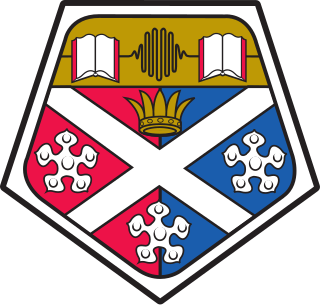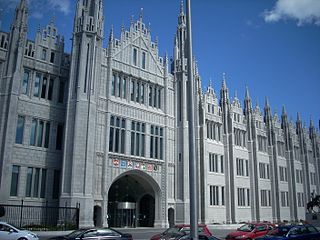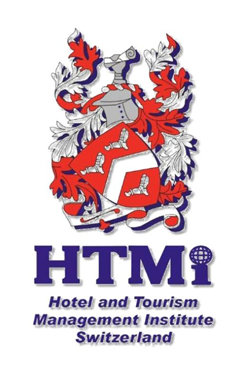
The University of Strathclyde is a public research university located in Glasgow, Scotland. Founded in 1796 as the Andersonian Institute, it is Glasgow's second-oldest university, having received its royal charter in 1964 as the first technological university in the United Kingdom. Taking its name from the historic Kingdom of Strathclyde, it is Scotland's third-largest university by number of students, with students and staff from over 100 countries.

Jordanhill College was a higher education college in Jordanhill, Glasgow, Scotland. It opened as a teacher training college in 1921. The college merged with the University of Strathclyde in 1993, becoming its Faculty of Education. In 2012 all educational activities were moved to the John Anderson Campus and the campus closed.
Education in Scotland is provided in state schools, private schools and by individuals through homeschooling. Mandatory education in Scotland begins for children in Primary 1 (P1) at primary school and ends in Fourth Year (S4) at secondary school. Overall accountability and control of state–education in Scotland rests with the Scottish Government, and is overseen by its executive agency, Education Scotland, with additional responsibility for nursery schools being the joint responsibility of both Education Scotland and the Care Inspectorate. Scotland's private schools are overseen by the Scottish Council of Independent Schools. Children in Scotland sit mandatory National Standardised Assessments in Primary 1 (P1), Primary 4 (P4), Primary 7 (P7) at the end of primary school, and Third Year (S3) in secondary school, which assist in monitoring children's progress and providing diagnostic data information to support teachers' professional judgement.

The ancient universities of Scotland are medieval and renaissance universities that continue to exist in the present day. Together, the four universities are the oldest universities in continuous operation in the English-speaking world after the universities of Oxford and Cambridge. The majority of the ancient universities of the British Isles are located within Scotland, and have a number of distinctive features in common, being governed by a series of measures laid down in the Universities (Scotland) Acts 1858–1966. The Universities (Scotland) Act 1966 uses the term 'older universities' to refer to St Andrews, Glasgow, Aberdeen and Edinburgh. The four universities are generally regarded as the country's most selective, eminent and well-ranked universities.

Glasgow Caledonian University, informally GCU, Caledonian or Caley, is a public university in Glasgow, Scotland. It was formed in 1993 by the merger of The Queen's College, Glasgow and Glasgow Polytechnic. It is located in the Cowcaddens district, just to the immediate north of the city centre, and is Glasgow's third university, after the University of Glasgow and the University of Strathclyde.

The Strathclyde Business School (SBS) is one of four faculties forming the University of Strathclyde in Glasgow, Scotland. Founded in 1973, but tracing its history back to the establishment of the Royal College of Science and Technology's Department of Industrial Administration in 1947, the school is located on Cathedral Street within the John Anderson campus of the university. It offers courses for business education and management development.
The Postgraduate Certificate in Laws is an intensive one-year, full-time professional legal qualification programme in Hong Kong. It allows graduates to proceed to legal training in order to qualify to practice as either a barrister or a solicitor in Hong Kong. The "LL." of the abbreviation for the certificate is from the genitive plural legum. The programme is similar to the Legal Practice Course or the Bar Professional Training Course in England and Wales, or the Certificate in Legal Practice (Malaysia) in Malaysia which focuses heavily on practical and procedural issues in legal practice, unlike a first degree in law.

The Common Professional Examination/Postgraduate Diploma in Law (CPE/PGDL) is a postgraduate law course in England and Wales taken by non-law graduates wishing to become either a solicitor or barrister in England and Wales. It is being replaced by the Solicitors Qualifying Examination (SQE) which was introduced on 1 September 2021.
The Legal Practice Course (LPC) – also known as the Postgraduate Diploma in Legal Practice – is a postgraduate course and the final educational stage for becoming a solicitor in England, Wales and Australia. The course is designed to provide a bridge between academic study and training in a law firm. It is a one-year, full-time course, and tuition fees range from £8,000-£17,300 a year. A small proportion of students may have their fees and some living expenses paid for by future employers under a training contract.
The Doctor of Engineering is a professional doctorate in engineering and applied science. An EngD is a terminal degree similar to a PhD in engineering but applicable more in industry rather than in academia. The degree is usually aimed toward working professionals.

There are fifteen universities in Scotland and three other institutions of higher education that have the authority to award academic degrees.
Legal education in the United Kingdom is divided between the common law system of England and Wales and Northern Ireland, and that of Scotland, which uses a hybrid of common law and civil law.
Strathclyde Law School was established in 1964 and operates within the Faculty of Humanities & Social Sciences at the University of Strathclyde, in Glasgow, Scotland.

The Sutton Trust is an educational charity in the United Kingdom which aims to improve social mobility and address educational disadvantage. The charity was set up by educational philanthropist, Sir Peter Lampl in 1997.

The Dundee Law School is the law school of the University of Dundee in Scotland. It provides undergraduate and postgraduate teaching in Scots and English law, permitting students to qualify into all three United Kingdom legal jurisdictions. The law school traces its roots to the University of St. Andrews, and has placed in the top 15 law schools in the UK on the University League Tables. The school is based in the Scrymgeour Building—named for Henry Scrymgeour, a 16th-century legal philosopher from Dundee—while the Law Library is based in the libraries building, both on the university's main campus. The Law School is part of the wider School of Social Sciences, Humanities and Law at Dundee.

The School of Law at the University of Glasgow provides undergraduate and postgraduate courses in Law, and awards the degrees of Bachelor of Laws, Master of Laws, LLM by Research, Master of Research (MRes) and Doctor of Philosophy, the degree of Doctor of Laws being awarded generally only as an honorary degree.

The Strathclyde Institute of Education is one of the schools which make up the Faculty of Humanities and Social Sciences at the University of Strathclyde in Glasgow, Scotland. The Faculty itself is split up into the a number of Educational Departments which offer undergraduate and postgraduate courses.

The University of Aberdeen School of Law is the law school of University of Aberdeen, located in Aberdeen, Scotland. Established in 1495, it is consistently ranked among the top 10 law schools in the United Kingdom.

HTMi, Hotel and Tourism Management Institute Switzerland is a private educational institute, that offers undergraduate and postgraduate academic degrees. The Institute provides hospitality management development courses and has its campus in Sörenberg, Switzerland. Each semester the Institute has approximately 200 students from more than 35 nationalities to engage its range of programmes, of which a similar number of additional students will be concurrently undertaking work placements, supported by the school, in Switzerland and internationally to consolidate their academic training. Currently, the Hotel and Tourism Management Institute is organised into six centres:
The Scottish Informatics and Computer Science Alliance (SICSA) is a "research pool" funded by the Scottish Funding Council. A research pool is a collaboration of Scottish university departments whose broad objective is to create a coherent research community that will improve the quality of research carried out in Scotland in the pool-related discipline.














